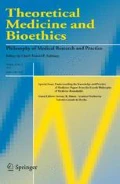Abstract
This paper offers a constructivist account of bioethics as an alternative to previous discussions that explained the ethics of medicine by an extrapolation of principles or virtues from ordinary morality. Taking medicine as a higher and special calling, I argue that the practice of medicine would be impossible without the trust of patients. Because trust is a necessary condition for medical practice, the ethics of the profession must provide the principles for guiding physician behavior and the profession toward promoting trust and being trustworthy. In a phrase, that principle is “seek trust and deserve it.” I sketch out how the concept of trust provides a different justification for common sense principles of bioethics and explain how the concept of trust provides reasonable guidance for resolving moral conflicts within medicine. The trust-seeking approach provides a new and unexpected ordering of some traditional medical values, it reveals the weightiness of previously undervalued bioethical precepts, and illuminates the centrality of some largely ignored obligations of medicine. It also has the power to guide clinical practice and to inform the profession about standards for medical institutions.
Similar content being viewed by others
Author information
Authors and Affiliations
Rights and permissions
About this article
Cite this article
Rhodes, R. Understanding the Trusted Doctor and Constructing a Theory of Bioethics. Theor Med Bioeth 22, 493–504 (2001). https://doi.org/10.1023/A:1014430208720
Issue Date:
DOI: https://doi.org/10.1023/A:1014430208720




